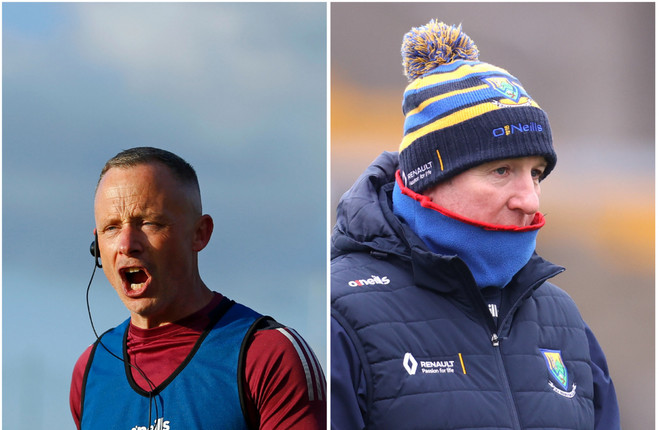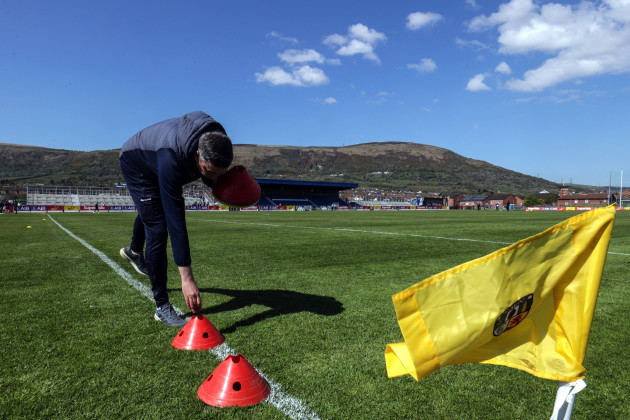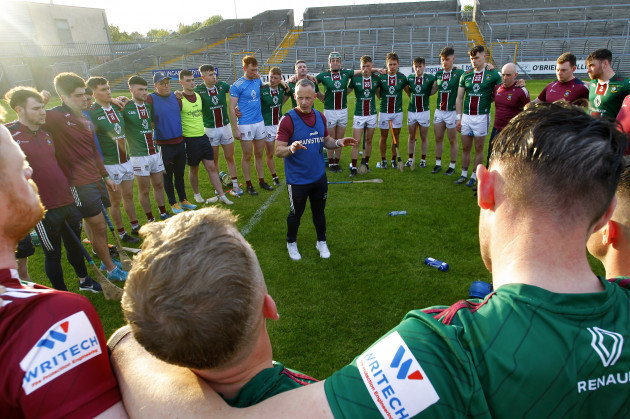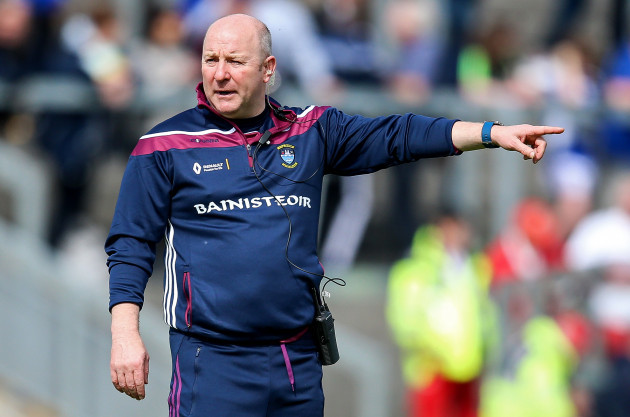KEVIN MCSTAY IS a little long in the tooth to be proving a rod for his own back on his first day. In various guises and different forms, this week he was provided with ample opportunity to declare it his intention to finally end Mayo’s eternal wait.
The questions came in MacHale Park at the unveiling press night. Why did you take the gig? Tell us about your vision. What is the goal? Eventually, out it came. Did you take this job to win the All-Ireland?
The obvious answer is yes. Forceful assertions that there will be no talk of transition suggest as much but it is one thing to know it, it is quite another to declare so publicly and generate inevitable headlines. All it would take is one opening-day loss for that to become a stick to be beaten with.
More importantly, this new regime can’t start at the end. What happens in the meantime is crucial. As McStay said and his flanking sectors emphasised, his first measurement of success will be what happens between now and December.
“The workload is outrageous,” he declared, despite the fact he hasn’t so much as looked at a cone yet. Pre-season won’t kick off for another two months.
As has been tediously over-discussed, the second half of the year is utterly devoid of inter-county action. Of course, that doesn’t mean managers are off the clock. What exactly is it they do in the off-season?
“I don’t know if there is an off-season really,” says Westmeath hurling manager Joe Fortune.
“I am looking at this from a personal point of view. When I’m involved in something, I immerse myself in it.
“There is the obvious thing of spending more time with the family than you would between November and May, but it doesn’t stop. Planning, organising, looking at ways to improve the setup. You can’t let that slide.
“Particularly in a county you aren’t from, you find yourself adopting what they do before you get a chance to put your own stamp on it.
“As soon as we beat Laois in May, we wanted to let the lads enjoy it. How do I enjoy it myself? We’d three aims at the start of the season. Win the Keogh Cup. Get promoted in the league and retain status our championship status.
“But our off-season has to start then. How do I improve the setup as we jump from Division 2 to 1? Our first three league games this year were Kerry, Carlow and Meath. Next year the likelihood is will be something like Waterford, Limerick and Cork. I need to think and plan for that. How do we make the setup better?”
Westmeath went above and beyond their stated ambitions for 2022, winning the league final and claiming a scalp in the Leinster championship with a draw against Wexford. Having previously worked in the Dublin underage system and winning a county title with Ballyboden in 2018, Fortune knew of the potential pitfalls after a successful campaign. He needed to immediately set their course so they could steer clear.
It was essential that Westmeath bank 2022 and build on it. After their championship ended, he conducted a comprehensive review with players and coaches in order to kick on in 2023.
“In a high-performance environment when you need lads to buy in, you need to encourage lads to ask questions and give feedback. At the end of the season, I went to them and said we achieved our three main aims this year. How do we make this setup better? What do we need to look at?
“Thankfully, the feedback was very positive. It is a few tweaks now. How do we make nutrition better? Stuff like that.”
In a county like Westmeath, the clubs are vital. The hurlers have no centre of excellence or training base. Without a positive relationship with the clubs, they’d have nowhere to train. That was a priority in year one. Heading into his second season, Fortune is now able to focus on what is happening on the field.
“A big thing for me was getting to as many club games as I could. Are there any rough diamonds that I could do something with?
“At the same time for established lads, you have to respect the clubs. When I was Ballyboden manager, I didn’t want the intercounty manager interfering at a time when I had my players for club windows.
“During that April for club month, I was mad to get Conal Keaney or Paul Ryan back into the club setup. I didn’t want or appreciate at times the county manager having control at that time. From the start, I said I won’t be interfering with players during their club window.
“One thing I said to players leaving the dressing room after our last game. ‘You need to be the best players in your club. Step up for the next six months. Don’t turn up as a county player and waltz around. Drive standards.’”
Colin Kelly was at the helm of his native Louth between 2014 and 2017, steering them to successive league promotions in his last two years. He then moved south, spending time with Westmeath and Wicklow.
He figured the transition from working with your own to being an outside manager would be manageable. Instead, the difference was colossal. They are worlds apart.
“Doing it with your own is a lot easier in terms of logistics,” Kelly explains.
“The people I was working with as Louth manager are people I stood in the dressing room with, people I managed before. People from clubs I knew. A county board with officials who were there when I was a player.
“Those relationships are established and they are central to being successful. Them and these huge backroom teams, you need to work to build a relationship and connection with those guys. When you go into a new job, you need to gel it all together and let’s be honest, it is not always rosy within those factions.”
After four games in charge, last March Wicklow announced Kelly was stepping down due to work commitments. That journey down the M50 was never ending and the post all-consuming.
“I ended up doing 16 to 18-hour days. I found myself taking time off work. It just didn’t work out. The lesson I learned is sometimes you have to say no.
“It is hard when the opportunity to be involved at that level comes up but sometimes it is better to say no. When you are 9-5 and have a young family that are starting out on their sporting careers, you can’t take on another job.”
In hindsight, those various experiences left lingering lessons. As well as managing three counties, Kelly coached Wexford for a year under Paul McLoughlin. Out on the field, developing skills and improving players was pure bliss.
And it left him questioning the traditional pathway. Play county, retire. Coach club, gradually step up. Then become a manager. How do they really relate to each other? Extraordinary ability in one does not guarantee success in the other. Those long winter months of dealing with everything but football were wearisome.
“I had one ambition in life. To play for Louth. When that was achieved, I couldn’t play any longer my next ambition was could I manage Louth.
“I immersed myself in coach education. Then I ended up coaching teams doing ok and I got the opportunity to manage my county.
“The thing I loved was the connection on the pitch as a coach. Then I can’t coach anymore because I am the manager. I need to bring in a coach and you can’t manage and coach. So the very reason I wanted to be involved, when you achieve the goal to manage, you have to step back from doing what you want to do.
“Rugby has it down to a T. A head coach coaches. The manager or director does all the other stuff.
“And if I am being 100% honest, I think I’m a good coach. I don’t think I’m a good manager. You can’t sugarcoat this. I ended up in the position because of what I did as a coach.
“I hadn’t strategised brilliantly, it is a different skill set. I can set teams up and improve players, but when you take county jobs you need to step back and oversee the whole thing.”
Joe Fortune works as a teacher. At the end of the day, he boils that and management down to its simplest components. The main task is dealing with people. Forging bonds with them, relying on them.
In Westmeath, he has knowledge locals in the set-up like Eddie Casey and Keith Quinn. Players like Tommy Doyle who are fixated on self-improvement. His task is to tie it all together and keep the curve upwards.
That challenge never yields. It can’t. Standing still means falling behind.
“We played Laois on the 21st May, if I sat on my hands until the county final or we stayed with the same setup, same group, doing the same thing, you are only going one way: backwards. Everyone is battling to avoid that.”




